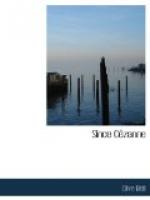English criticism is puzzled by Derain because very often it is confronted by things of his which seem dull and commonplace, to English critics. These are, in fact, the protests of Derain’s genius against his talent, and whether they are good or not I cannot say. Derain has a super-natural gift for making things: give him a tin kettle and in half a morning he will hammer you out a Summerian head; he has the fingers of a pianist, an aptitude that brings beauty to life with a turn of the wrist; in a word, that sensibility of touch which keeps an ordinary craftsman happy for a lifetime: and these things terrify him. He ties both hands behind his back and fights so. Deliberately he chooses the most commonplace aspects and the most unlovely means of expression, hoping that, talent thus bound, genius will be stung into action. Sometimes, no doubt, Achilles stays sulking in his tent. I suppose Derain can be dull.
But what does he want this genius of his to do? Nothing less, I believe, than what the French genius did at its supreme moment, in the seventeenth century, what the Greek did in the fifth. My notion is that he wants to create art which shall be perfectly uncompromising and at the same time human, and he would like it none the worse, I dare say, were it to turn out popular as well. After all, Racine did this, and Moliere and La Bruyere and Watteau and Chardin and Renoir. It is in the French tradition to believe that there is a beauty common to life and art. The Greeks had it, so runs the argument, and the Italians of the high renaissance, but the English poets tended to sacrifice art to beauty, and the moderns—so Derain may think—sacrifice beauty and grandeur to discretion. The motto “Safety first” did, I will confess, just float across my eyes as I walked through the last salon d’automne. And, then, Derain may feel that there is in him something besides his power of creation and sense of form, something which philosophers would call, I dare say, a sense of absolute beauty in things, of external harmony. However we may call it, what I mean is the one thing at all worth having which the Greeks had and the Byzantines had not, which Raphael possesses more abundantly than Giotto. In Derain this sense is alive and insistent; it is urging him always to capture something that is outside him; the question is, can he, without for one moment compromising the purity of his art, obey it? I do not know. But if he cannot, then there is no man alive to give this age what Phidias, Giorgione, and Watteau gave theirs.




